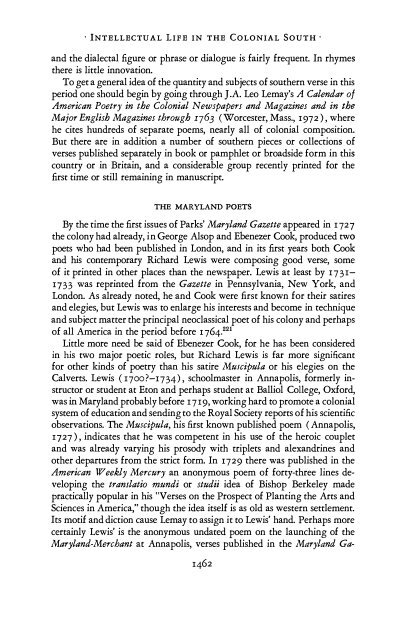Literature, Principally Belletristic - University of Tennessee, Knoxville
Literature, Principally Belletristic - University of Tennessee, Knoxville
Literature, Principally Belletristic - University of Tennessee, Knoxville
You also want an ePaper? Increase the reach of your titles
YUMPU automatically turns print PDFs into web optimized ePapers that Google loves.
· INTELLECTUAL LIFE IN THE COLONIAL SOUTH '<br />
and the dialectal figure or phrase or dialogue is fairly frequent. In rhymes<br />
there is little innovation.<br />
To get a general idea <strong>of</strong> the quantity and subjects <strong>of</strong> southern verse in this<br />
period one should begin by going through J.A. Leo Lemay's A Calendar <strong>of</strong><br />
American Poetry in the Colonial Newspapers and Magazines and in the<br />
Major English Magazines through I763 (Worcester, Mass., 1972), where<br />
he cites hundreds <strong>of</strong> separate poems, nearly all <strong>of</strong> colonial composition.<br />
But there are in addition a number <strong>of</strong> southern pieces or collections <strong>of</strong><br />
verses published separately in book or pamphlet or broadside form in this<br />
country or in Britain, and a considerable group recently printed for the<br />
first time or still remaining in manuscript.<br />
THE MARYLAND POETS<br />
By the time the first issues <strong>of</strong> Parks' Maryland Gazette appeared in 1727<br />
the colony had already, in George Alsop and Ebenezer Cook, produced two<br />
poets who had been published in London, and in its first years both Cook<br />
and his contemporary Richard Lewis were composing good verse, some<br />
<strong>of</strong> it printed in other places than the newspaper. Lewis at least by 1731-<br />
1733 was reprinted from the Gazette in Pennsylvania, New York, and<br />
London. As already noted, he and Cook were first known for their satires<br />
and elegies, but Lewis was to enlarge his interests and become in technique<br />
and subject matter the principal neoclassical poet <strong>of</strong> his colony and perhaps<br />
<strong>of</strong> all America in the period before 1764.22 1<br />
Little more need be said <strong>of</strong> Ebenezer Cook, for he has been considered<br />
in his two major poetic roles, but Richard Lewis is far more significant<br />
for other kinds <strong>of</strong> poetry than his satire Muscipula or his elegies on the<br />
Calverts. Lewis (1700 ?-1734 ), schoolmaster in Annapolis, formerly instructor<br />
or student at Eton and perhaps student at Balliol College, Oxford,<br />
was in Maryland probably before 1719, working hard to promote a colonial<br />
system <strong>of</strong> education and sending to the Royal Society reports <strong>of</strong> his scientific<br />
observations. The Muscipula, his first known published poem (Annapolis,<br />
1727 ), indicates that he was competent in his use <strong>of</strong> the heroic couplet<br />
and was already varying his prosody with triplets and alexandrines and<br />
other departures from the strict form. In 1729 there was published in the<br />
American Weekly Mercury an anonymous poem <strong>of</strong> forty-three lines developing<br />
the translatio mundi or studii idea <strong>of</strong> Bishop Berkeley made<br />
practically popular in his "Verses on the Prospect <strong>of</strong> Planting the Arts and<br />
Sciences in America," though the idea itself is as old as western settlement.<br />
Its motif and diction cause Lemay to assign it to Lewis' hand. Perhaps more<br />
certainly Lewis' is the anonymous undated poem on the launching <strong>of</strong> the<br />
Maryland-Merchant at Annapolis, verses published in the Maryland Ga-<br />
1462















